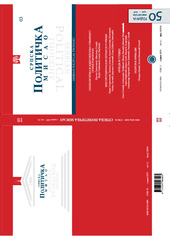Приказ основних података о документу
Institucionalni kapaciteti Srbije U rešavanju problema dece sa smetnjama u razvoju
Institutional capacities of serbia in Resolving the problem of children with Disabilities
| dc.creator | Otašević, Jadranka | |
| dc.creator | Dobrota-Davidović, Nada | |
| dc.date.accessioned | 2021-06-17T13:42:01Z | |
| dc.date.available | 2021-06-17T13:42:01Z | |
| dc.date.issued | 2018 | |
| dc.identifier.issn | 0354-5989 | |
| dc.identifier.issn | 0354-5989 | |
| dc.identifier.uri | http://rfasper.fasper.bg.ac.rs/handle/123456789/2832 | |
| dc.description.abstract | Rad je posvećen razmatranju i kritici postojeće politike i normativnih pristupa problemima dece sa smetnjama u razvoju u Republici Srbiji. Autori predstavljaju, analiziraju i kritikuju postojeća rešenja i predlažu sveobuhvatne mere kojima bi bio dat značajan doprinos procesu identifikacije, analize i pružanja pomoći i podrške deci sa smetnjama u razvoju. Analiza situacije u kojoj žive ova deca, pokazuje da u njihovom životnom prostoru postoje brojne prepreke koje stoje na putu zadovoljenju njihovih potreba. Podaci o učestalosti smetnji su veoma heterogeni, zbog korišćenja različitih kriterijuma za njihovo identifikovanje. Zbog nepostojanja objedinjenih centralizovanih podataka o ovoj populaciji, nemoguće je pratiti kretanje ove pojave u odnosu na društveno-ekonomske i socijalne promene. Utvrđivanje oblika i zastupljenosti smetnje u razvoju, kod dece opšte populacije može ukazati na potrebe individualizacije rada u vaspitno-obrazov- nim institucijama, uz poštovanje osnovnih postulata inkluzi- vnog obrazovanja, kao i na mere kliničkog tretmana za svaku od utvrđenih kategorija smetnji u zdravstvenim institucijama. Ut- vrđivanje prevalencije smetnji u razvoju omogućilo bi precizno planiranje obima i strukture programa sekundarne i tercijarne prevencije u okviru zdravstvenih, vaspitno-obrazovnih i ustano- va socijalne zaštite, dok bi uvid u zastupljenost smetnji omo- gućio šire planiranje mentalno-higijenskih i kulturnih mera za poboljšanje kvaliteta života ove dece. | |
| dc.description.abstract | The behavior of society towards children depends of the way in which society understands childʼs development and learning. The differences in the understanding of the child, his development and learning are conditioned by culture, tradition and the needs of society and inbuilt system of values. The birth of a baby with a disability or finding out that a child suffers from a disability can be traumatic event for parents and can have profound effects on the entire family. The parents of disabled children need more inner strength than other parents, not just to deal with the particular difficulties that inevitably arise in caring for the disabled, but also to cope with the challenges of everyday life. The child should grow up in a family environment, in an atmosphere of happiness, love and understanding. Parents are responsible for the well-being of their children, and the state must support parents in exercising their responsibilities. Everyday life of children with disability is rife with many limitations such as architectural, transport, information as well as medical, psychological, legal, economic and social barriers. The attitude and distrust of the environment towards children and people with disabilities is the most significant source of problems for most of this population, and this is the barrier that is most difficult to overcome, even in societies where the protection of children and youth with disabilities is very developed. In order to keep a proper policy in terms of providing an institutional base and staff to work with children with disabilities, it is necessary to record these children and integrate the obtained information at the national level. This would enable the precise planning of the scope and structure of the program, secondary and tertiary prevention in the context of health, educational and social welfare institutions, while insight into the presence of interference allow wider planning mental-health and cultural measures to improve the quality of life of these children. | |
| dc.language | sr | |
| dc.publisher | Institut za političke studije, Beograd | |
| dc.rights | openAccess | |
| dc.rights.uri | https://creativecommons.org/licenses/by/4.0/ | |
| dc.source | Srpska politička misao | |
| dc.source | Srpska politička misao | |
| dc.subject | institucije | |
| dc.subject | zdravstvena politika | |
| dc.subject | socijalna politika | |
| dc.subject | obrazovanje | |
| dc.subject | deca sa smetnjama u razvoju | |
| dc.subject | institutions | |
| dc.subject | health policy | |
| dc.subject | social policy | |
| dc.subject | education, children with disabilities | |
| dc.title | Institucionalni kapaciteti Srbije U rešavanju problema dece sa smetnjama u razvoju | sr |
| dc.title | Institutional capacities of serbia in Resolving the problem of children with Disabilities | |
| dc.type | article | |
| dc.rights.license | BY | |
| dc.citation.epage | 173 | |
| dc.citation.issue | 3 | |
| dc.citation.other | 61(3): 157-173 | |
| dc.citation.rank | M24 | |
| dc.citation.spage | 157 | |
| dc.citation.volume | 61 | |
| dc.identifier.doi | 10.22182/spm.6132018 | |
| dc.identifier.fulltext | http://rfasper.fasper.bg.ac.rs/bitstream/id/8083/bitstream_8083.pdf | |
| dc.type.version | publishedVersion |


